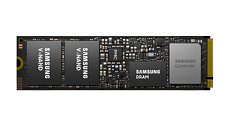- Joined
- Oct 9, 2007
- Messages
- 47,670 (7.43/day)
- Location
- Dublin, Ireland
| System Name | RBMK-1000 |
|---|---|
| Processor | AMD Ryzen 7 5700G |
| Motherboard | Gigabyte B550 AORUS Elite V2 |
| Cooling | DeepCool Gammax L240 V2 |
| Memory | 2x 16GB DDR4-3200 |
| Video Card(s) | Galax RTX 4070 Ti EX |
| Storage | Samsung 990 1TB |
| Display(s) | BenQ 1440p 60 Hz 27-inch |
| Case | Corsair Carbide 100R |
| Audio Device(s) | ASUS SupremeFX S1220A |
| Power Supply | Cooler Master MWE Gold 650W |
| Mouse | ASUS ROG Strix Impact |
| Keyboard | Gamdias Hermes E2 |
| Software | Windows 11 Pro |
Samsung Electronics, the world leader in advanced memory technology, today announced it has begun mass-producing PM9E1, a PCIe 5.0 SSD with the industry's highest performance and largest capacity. Built on its in-house 5-nanometer (nm)-based controller and eighth-generation V-NAND (V8) technology, the PM9E1 will provide powerful performance and enhanced power efficiency, making it an optimal solution for on-device AI PCs. Key attributes in SSDs, including performance, storage capacity, power efficiency and security, have all been improved compared to its predecessor (PM9A1a).
"Our PM9E1 integrated with a 5 nm controller delivers industry-leading power efficiency and utmost performance validated by our key partners," said YongCheol Bae, Executive Vice President of Memory Product Planning at Samsung Electronics. "In the rapidly growing on-device AI era, Samsung's PM9E1 will offer a robust foundation for global customers to effectively plan their AI portfolios."

Thanks to the eight-channel PCIe 5.0 interface, the sequential read and write speeds of the new SSD have more than doubled compared to the previous generation, reaching up to 14.5 gigabytes-per-second (GB/s) and 13 GB/s, respectively. This powerful performance enables faster data transfer even with data-intensive AI applications, allowing a 14 GB large language model (LLM) to be transferred from the SSD to DRAM in less than a second.
The PM9E1 offers a range of storage options, including 512 GB, 1 terabyte (TB), 2 TB and the industry's largest capacity of 4 TB. The 4 TB option is especially an optimum solution for PC users in need of high-capacity storage for large-sized files such as AI-generated contents, data-heavy programs and high-resolution videos, as well as tasks that require intensive workloads such as gaming.
Additionally, the significantly improved power efficiency of over 50% allows for longer battery life which is ideal for on-device AI applications.
For stronger security measures, Samsung has applied Security Protocol and Data Model (SPDM) v1.2 to the PM9E1. The SPDM specification provides 'Secure Channel,' 'Device Authentication' and 'Firmware Tampering Attestation' technologies that can help prevent supply chain attacks involving forgery or manipulation of stored data in the product during production or distribution processes.
Starting with PM9E1, Samsung plans to expand its advanced SSD offerings to global PC makers and expects to launch PCIe 5.0-based consumer products in the future to solidify its leadership in the on-device AI market.
View at TechPowerUp Main Site
"Our PM9E1 integrated with a 5 nm controller delivers industry-leading power efficiency and utmost performance validated by our key partners," said YongCheol Bae, Executive Vice President of Memory Product Planning at Samsung Electronics. "In the rapidly growing on-device AI era, Samsung's PM9E1 will offer a robust foundation for global customers to effectively plan their AI portfolios."

Thanks to the eight-channel PCIe 5.0 interface, the sequential read and write speeds of the new SSD have more than doubled compared to the previous generation, reaching up to 14.5 gigabytes-per-second (GB/s) and 13 GB/s, respectively. This powerful performance enables faster data transfer even with data-intensive AI applications, allowing a 14 GB large language model (LLM) to be transferred from the SSD to DRAM in less than a second.
The PM9E1 offers a range of storage options, including 512 GB, 1 terabyte (TB), 2 TB and the industry's largest capacity of 4 TB. The 4 TB option is especially an optimum solution for PC users in need of high-capacity storage for large-sized files such as AI-generated contents, data-heavy programs and high-resolution videos, as well as tasks that require intensive workloads such as gaming.
Additionally, the significantly improved power efficiency of over 50% allows for longer battery life which is ideal for on-device AI applications.
For stronger security measures, Samsung has applied Security Protocol and Data Model (SPDM) v1.2 to the PM9E1. The SPDM specification provides 'Secure Channel,' 'Device Authentication' and 'Firmware Tampering Attestation' technologies that can help prevent supply chain attacks involving forgery or manipulation of stored data in the product during production or distribution processes.
Starting with PM9E1, Samsung plans to expand its advanced SSD offerings to global PC makers and expects to launch PCIe 5.0-based consumer products in the future to solidify its leadership in the on-device AI market.
View at TechPowerUp Main Site






